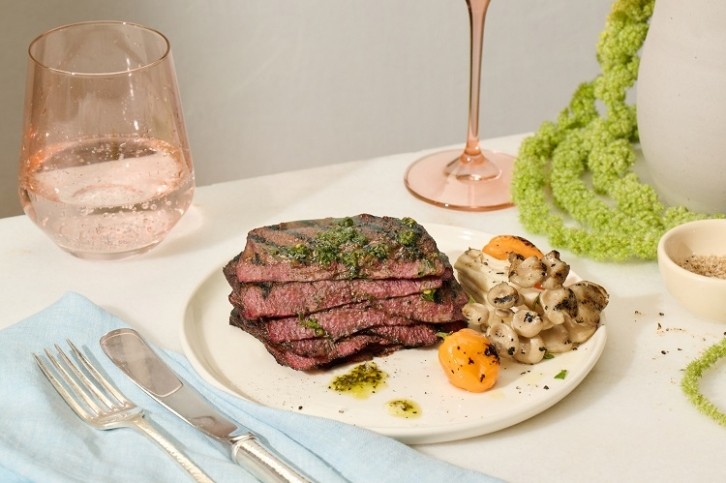Regulatory greenlight for cultivated beef leaves EU sector ‘hopeful’

In Israel, Aleph Farms is celebrating having received regulatory approval from Israel’s Ministry of Health (MoH) in the form of a ‘No Questions’ letter.
The cultivated meat product in question is Aleph Farms’ Petit Steak, which sits under the start-up’s Aleph Cuts branding. Approval of the cell-based meat and plant-based hybrid is not only a first for a non-chicken cultivated meat product, but also marks Israel’s first greenlight for cultivated meat.
While an obvious boon for Israel’s cultivated meat scene, stakeholders in Europe would be forgiven for feeling despondent. The EU has yet to grant regulatory approval to a cultivated meat product, and FoodNavigator is unaware of any submissions to date (although at least one European cultivated meat player has submitted a novel food dossier abroad).
But according to European stakeholders, the MoH ‘no questions letter’ offers hope. Cellular Agriculture Europe, a coalition of food companies making cultivated meat, poultry, seafood and ingredients, welcomes the development, with secretary general Caroline Rey describing the move as ‘another step towards the much-needed recognition of cellular agriculture’s role towards protein diversification’.
Stakeholders hope approvals will ‘pave the way’ for authorisation in EU
Cellular Agriculture Europe boasts food tech heavyweights Aleph Farms, Bluu Seafood, Mosa Meat and Meatable amongst its membership base. FMCG major Nestlé is an associated member.
The association was founded in late 2021, a full year after the first regulatory approval for a cultivated meat product (a cultivated chicken ingredient from Eat Just-owned GOOD Meat) was achieved in Singapore. Cellular Agriculture Europe has since observed GOOD Meat and UPSIDE Foods receive the regulatory greenlight in the US for their respective cultivated chicken products.
The cultivated meat sector has since observed other regulatory developments within Europe, but outside of the EU. Last year, Aleph Farms applied for regulatory approval first in Switzerland and then the UK. At the time, policy manager at alternative proteins advocate the Good Food Institute (GFI) Europe, Seth Roberts, said it was ‘fantastic’ to see Switzerland leading the way for cultivated meat in Europe, but ‘striking’ that Europe’s first-ever cultivated meat application arrived in Switzerland rather than Brussels.
“The EU must develop a coherent strategy to support the sustainable protein sector and ensure regulatory processes are clear, in order to reap the benefits of cultivated meat.”
Responding to Aleph Farms’ regulatory news in Israel, GFI founder and president Bruce Friedrich said the announcement marks a ‘critical leap’. “We’re thrilled that consumers in Israel will soon be able, like those in the US and Singapore, to purchase these delicious products.”
The European Union, where cultivated was first invented, is, glaringly, not on his list. But EU cultivated meat players hope that the growing number of regulatory approvals will only serve to increase the chance of a greenlight on home soil.
“One of our association’s goals is to support its members in their future applications for approval in the EU and we hope that the multiplication of good news in Singapore, US and now Israel will pave the way for a smooth authorisation process in Europe,” Cellular Agriculture Europe’s Rey told FoodNavigator.
How does Aleph Farms make its cultivated Petit Steak?
The first cultivated meat product, a burger, was developed in 2013 by professor Mark Post at Maastricht University, the Netherlands. It wasn’t until 2016 that the first cultivated meat company UPSIDE Foods, publicly launched, and the following year Aleph Farms was founded in Israel.
To make its cultivated meat products, Aleph Farms uses GM- and antibiotic-free starter cells from a single fertilised Black Angus cow egg and grows them into ‘real meat cuts’ in a controlled, laboratory setting. Aside from these starter cells, there are no animal-derived components in the cultivation process and final Petit Steak product.
The product does not contain cultivated meat only, however. Aleph Farms’ Petit Steak includes a plant protein matrix, which provides a supporting structure for the Angus cells to grow. “This plant protein models the process of cellular growth within a cow, where cells grow along a supporting network of proteins and other compounds,” CEO Didier Toubia recently told FoodNavigator.
“Our matrix is porous, with a lot of surface area and space for oxygen, allowing the cells to mimic the formation of muscle fibres. It also supports cell maturation and their ability to form tissue, contributing to the steaks’ quality texture.”
Is there European appetite for cultivated meat?
While Cellular Agriculture Europe is hopeful regulatory approvals will come down the line, not all in the EU feel the same way. Last year, Italy passed a bill banning the production and marketing of cultivated meat and France is now considering similar restrictions.
Earlier this week, at the Agriculture and Fisheries Council (AgriFish) Committee Discussion, delegations from Austria, France and Italy proposed that market authorisation decisions in the EU be put on hold until questions related to the ethics, economics, sustainability, social society, public health, and transparency of cultivated meat are answered.
The delegations also queried whether the current novel foods regulation provides a ‘suitable and comprehensive’ frame to assess the potential risks associated with these products.
However other representatives at the AgriFish meeting did not share these views – Dutch and Danish participants, for example, defended cultivated meat’s merits – suggesting there is some Member State appetite for cultivated meat across the bloc.



























